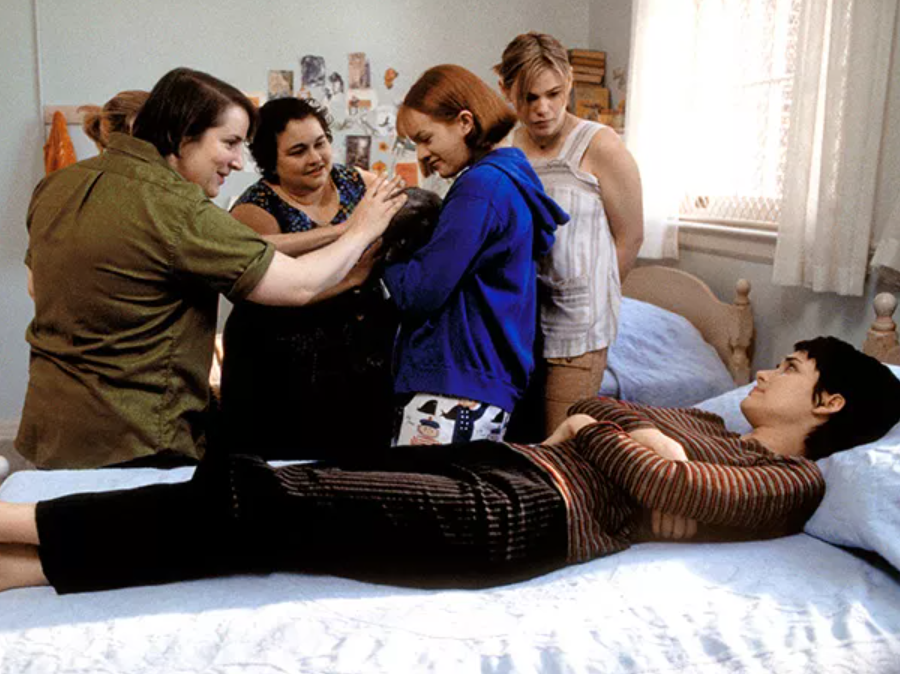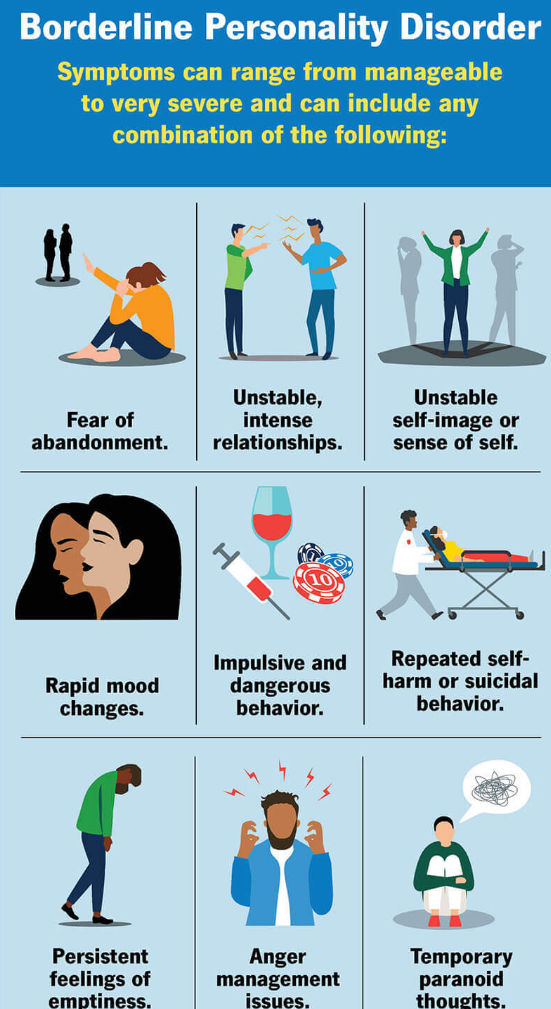This is a movie (based on a book) about a young college age woman named Susanna. Susanna grew up in a very wealthy and influent family, the type of family that appears perfect on the outside and will do anything to keep that image up. This movie is based almost entirely on the idea that you can either drive yourself crazy (by choice…) or get over it and move on. An idea I personally detest and disagree with.
Susanna appears to have attempted suicide, and is sent to Claymoore mental institution. Dealing with mental illness, is both an emotionally and physically isolating experience. And when Susanna is sent to Claymoore, she is even further isolated from her social circle. The therapist often implies to Susanna that her struggles with mental illness are different from the other girls because she is choosing this, and the other girls are chemically wired with a mental illness and have no other choice. This further intensifies the segregation and isolation Susanna feels.


I have many personal feelings about this film. I think the way they present Mental Health struggles is not wonderful. They give off a very biased and stigma filled image of women experiencing mental health struggles. I felt personally as a woman a tad offended at their depiction of a lot of the characters. (I think this has a lot to do with the movie being made in 1999)
Though the characters are largely sympathetic, they’re also mostly simplistic, one-dimensional representations of their illnesses. Georgina is a pathological liar; Polly is in a state of arrested development; Janet has anorexia, but we never learn anything else about these women. It also rubbed me the wrong way that Cynthia was literally just institutionalized for being Gay….. As if there is something wrong with her because of that ?
Susanna, our main character is diagnosed with Borderline Personality Disorder. As pictured below, BPD has many many symptoms. This movie I think depicts only the symptoms that are interesting to watch as a viewer, promiscuity, impulsivity, etc. And tends to leave out the other more challenging symptoms (for a lack of better words). It seems like in this movie they use BPD as more of a catch all because her symptoms don’t fit the mold of one specific mental illness. This feeling deepens her sense of isolation by setting her further apart from others living with mental illness. Whereas her fellow patients are afflicted by sociopathy, schizophrenia, depression, and PTSD, It is made Clear that Susanna does not agree with her diagnosis. And believes that it is a direct assault on who she is rather than an attempt to understand and remedy something that is temporarily off-balance within her mind.

Something else that bothers me a bit about this film is that it is told to Susanna, repeatedly that her struggles are not real, and not as bad as the other girls in there. The head nurse in the women’s unit of Claymoore tells Susanna that she is lazy, spoiled, self indulgent. It almost depicts Susanna as being there for a little vacation, instead of being there for treatment like the others. The doctor at the beginning tells Susanna that she should consider going to Claymoore for a little “rest”. I can not talk from personal experience but I can say that I think this movie enhances the stigma of a psychiatric facility and mental illness.
“In her closing monologue, Susanna herself says that she “wasted a year of [her] life” in the psychiatric facility, implying, again, that she didn’t actually need the treatment and could have chosen to do things differently. But in reality, BPD is a serious condition that can be incredibly painful to live with, and just like depression, OCD, or sociopathy, sufferers can’t just “choose” to be “sane.”” – Lindsey Clouse (2024)
I just really despise this movie for a lot of reasons but I think it can not be denied that the environment Susanna was inherently forced into does impact her, and will continue to have a lasting impact on her. She goes to Claymoore with no direction, and comes out of Claymoore with a new perspective, and a new outlook on life. She at one point has a choice, when asked to run away with Toby, her boyfriend(ish). And I think a large turning point in the movie, when she starts to realize she may possibly belong there more than she thinks, is when she denies Toby’s request and choses to stay at Claymoore. You can tell she is starting to warm to the other girls by this time.
“Girl, Interrupted” is a small, intense period piece with a tough-love attitude toward lazy, self-indulgent little girls flirting with madness: You can drive yourself crazy, or you can get over it. The choice is yours.” – New York Times (1999)
Comments
9 responses to “Girl Interrupted”
I wonder how as social workers, would we have tried to help Susanna and her peers in Claymoore? Would we have maybe tried to make the system benefit them and have patients leave the facility of those who do not need to be in them, such as the woman who was Gay?
It is such an interesting movie nonetheless. I do not like the way it portrays or somewhat romanticizes mental illnesses either. However, in a different perspective – maybe this was just how these mental facilities were like in the 60’s? After all, it was not uncommon for people who were Gay or behaved “un-normal” to be brought into mental facilities back then. Times truly have changed in the last century, and I am glad that we did because the treatment Susanna was given by staff would be unacceptable today. Terrifying!
Anyhow, I think you did an amazing job describing the movie and giving us your perspectives on such a film.
I actually liked this movie. I understand the frustration from the way things are portrayed but it reminds me of an updated girl version of One Flew Over The Cuckcoos Nest. You mentioned that it was made in the 90’s but it is supposed to be portrayed in the 60’s where being gay was still considered a mental disorder. Some of the illnesses are exaggerated I think to drive the point home that, that is what society sees as mental illness and Susanna (having diagnoses) doesn’t look like that so she must not have one. We even see the damage that bullying can cause when Lisa accuses Daisy of liking being molested. Realizing that untreated mental illness can change a person to not care like Lisa, Susanna decides that she does want to continue with treatment and not leave with her boyfriend. While I think this movie is dated it does show what occurred to people who were seen to have mental illness and how far we have come away from that stigma. There is still a lot of work to be done but I took from the movie the idea that mental illness doesn’t have to feel one way or another. Sometimes it is subtle.
Hi Kaia,
I enjoyed reading your blog and hearing your take on the film. You always do such a great job with your blogs! Like you, I found that the film went along with the stigma associated with mental illness and could have even validated the stigma that comes with people diagnosed with mental health disorders. Also, the idea that someone could “make themselves better” was clearly absurd because of the knowledge we have now, however, I reminded myself that the film was based on the 60’s so it’s possible they truly believed that back then. Thankfully we’ve come a long way! I remember learning about gays being institutionalized and was mortified – it was pretty common for people to be institutionalized, who would not be today.. like young children mixed with severely mentally ill adults! I know you work with a population that suffers from mental health disorders; I know as a society we’re becoming more educated on mental illness, but do you think there is still a common belief that they could “just get better” if they tried?
Overall, I actually enjoyed the film. I thought the acting was good and found it entertaining, but definitely didn’t agree with the majority of the film on a moral basis. I know the movie is based on a book, which is based on a true story (correct me if I’m wrong), so it would be interesting to see how someone would produce it today!
Hi Alexa!
Thank you,
I also am so curious how it would be produced today. It would be really interesting to have this done.
I do still think in some parts of the world that there still is a “just get over it” take on mental illness. Which is super unfortunate, and sad. And something that should be advocated for
I agree with you and I think this movie is about how psychiatric wards and staff mistreat patients. Also, social workers are underused in many hospitals and believe this movie is making a statement about it.
This happens to be one of my favorite movies of all time. I agree with you with it being that psychiatric awards and staff mistreat some patients. But at the same time, I don’t agree with that because there are some good places and staff out there that treat the patient with dignity with grace and don’t mistreat them. I love your take on this movie and it goes to show how much we have changed from when this movie was shot till now. I’m glad that you put the poster of borderline personality disorder on the blog. That made me realize so much more about it that I didn’t know so thank you for that.
Hi Sierra!
I agree. There are soooo many amazing places, but I think the way this specific place and this place only was portrayed was not up to par with the stigma in 2024
Hi Kaia, I really like your perspective on the movie. I just finished watching it and didn’t realize it like how you explained. And than I remember that when Susana’s almost boyfriend was there, the head nurse said she had the privilege to leave and go to a coffee shop or something. You pointed out the things I completely missed and now I see the movie differently. Thank you for your blog.
Hi Kaia,
I appreciated your very honest reflection on this movie. I liked the movie when I watched it several years ago. I think the reason why is because of the various personalities as portred by the characters. Each of them had some personality trait that I, myself, relate to. Both in terms of dealing with mental illness ( not to their extent, however), and the challenges that come with “womanhood” from a general perspective. There was a part in the movie if I remember correctly when one of the women took her life. Prior to that, she had been acting out in a variety of ways which was in a lot of ways, a foreshadow of what was to come. She was cutting, secluding, and having mood swings. I remember right before she took her life, she kind of led on she was going to be alright. This is reflective of individuals who deal with suicide ideation and depression. It comes as a total shock and you feel caught off guard in those situations. Even if you knew that person was dealing with these kinds of issues, it still comes as a surprise. This is why we as future social workers should be observant and aware of whoever it is we are helping. While we can’t save or necessarily help everyone, we can be empathetic for their situation and give them the support needed in their time of struggle. Sorry you didn’t enjoy the movie; it was depressing I know.